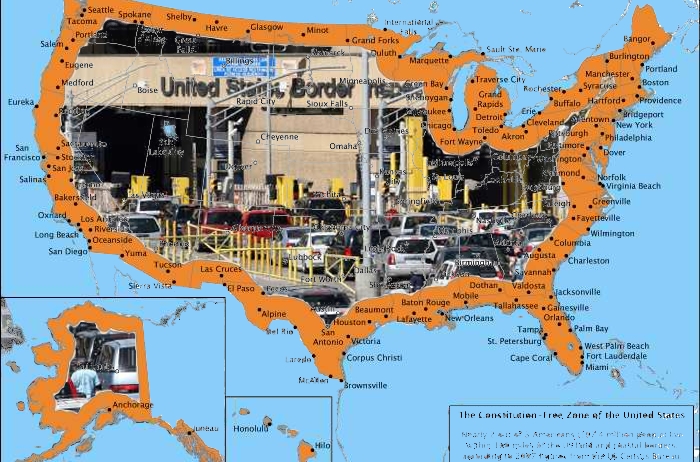
Judge Rules Against 4th Amendment Rights in 100 Mile Wide “Border” Around Entire US
Sometimes things that are true just sound too absurd to be believed. We all have been fooled before, so a healthy amount of skepticism is one of the tools of life we acquire through experience.
When we hear things such as there being a 100 mile “Constitution Free Zone” we naturally expect that there is more to the story than meets the eye. We suspiciously think that someone must have exaggerated or possibly got some bad information. If only that were the case.
A US federal judge has reaffirmed the invalidation of our fourth amendment rights against unreasonable search and seizure by upholding the notion that the American border is a one hundred mile wide zone which extends completely around the country. In doing so, the US Constitution has been usurped by a mere judicial opinion.
A lawsuit brought by the ACLU challenged the practice of DHS to search at will and capture data from anyone within this fabricated border zone. District Judge Edward Korman made his ruling in New York on Tuesday, over three years after the American Civil Liberties Union (ACLU) filed its suit.
The ACLU argued that since Americans put so much of their lives on their computers, cell phones, and other devices, fourth amendment protections of reasonable suspicions should apply before the government engages in a fishing expedition with people’s personal property and information.
According to Judge Korman, the area 100 miles inland falls under a “border exemption.” The so-called border exemption does not exist in the Constitution, but that didn’t have an impact on the ruling.
He provided insight into his reasoning by explaining, “Laptops have only come into widespread use in the twenty-first century. Prior to that time, lawyers, photographers, and scholars managed to travel overseas and consult with clients, take photographs, and conduct scholarly research.”

“No one ever suggested the possibility of a border search had a chilling effect on his or her First Amendment rights. While it is true that laptops make overseas work more convenient, the precaution plaintiffs may choose to take to ‘mitigate’ the alleged harm associated with the remote possibility of a border search are simply among the many inconveniences associated with international travel.”
The federal government has long conducted searches on travelers entering and leaving the US, but Congress expanded that policy by creating the Department of Homeland Security and setting up at least 33 checkpoints inside the country where people are stopped and asked to prove their citizenship.”
This explanation would seem to lay the foundation of the judge’s ruling as being the simplistic assertion that “because no one ever suggested” something. It is unclear how what someone never said would have relevance. It is also interesting that he was able to ascertain all of what anyone has ever suggested. That must have been exhaustive research and might have been what took him the three years in making a decision. He could also have been desperately searching for a legal basis for an illegal and illogical ruling, too. By the way, Judge, just for the record, I’ll suggest here and now that the possibility of a border search has a chilling effect on my First Amendment rights.
Regarding the Judge’s ruling that choosing to take precautions to ‘mitigate’ the alleged harm is an inconvenience which is part of international travel is fallacious. Compulsory cavity searches could be mandated as well and that would not make them a necessary part of international travel.
There is also no requirement that international travel has been conducted required at the inland checkpoints. Everybody passing through is stopped and questioned, regardless of their itinerary.
The contention by the judge that the establishment of 33 checkpoints inside the country, where people are stopped and asked to prove their citizenship is constitutional simply because DHS or Congress permits it, has failed to examine, or conducts those activities is also erroneous.
The lawsuit also noted that nearly two-thirds of the United States population lives within 100 miles of a US border. This ruling removes these fourth amendment protections for residents of New York, Washington, Boston, San Francisco, Los Angeles, Miami and other major metropolitan areas.
The citizens of the states of Florida and Hawaii have no related fourth amendment rights statewide.
The ACLU attorney who argued the case, Catherine Crump, said that the organization is considering whether to file an appeal. She said, “We’re disappointed in today’s decision, which allows the government to conduct intrusive searches of Americans’ laptops and other electronics at the border without any suspicion that those devices contain evidence of wrongdoing,” she said.
“Suspicionless searches of devices containing vast amounts of personal information cannot meet the standard set by the Fourth Amendment… Unfortunately, these searches are part of a broader pattern of aggressive government surveillance that collects information on too many innocent people, under lax standards, and without adequate oversight.”
The Fourth Amendment reads, “The right of the people to be secure in their persons, houses, papers, and effects, against unreasonable searches and seizures, shall not be violated, and no warrants shall issue, but upon probable cause, supported by Oath or affirmation, and particularly describing the place to be searched, and the persons or things to be seized.” The violation is glaring.
The controlling authority is working tirelessly to take away our rights and relegate us to little more than slaves subject to their whim. An invalid decision, regardless of who makes it, is still invalid. You would have thought, if it was going to take him three years, he’d of least have gotten it right.
Please scroll to the bottom of this page for more posts from Rick Wells, or to “Like” him on Facebook or “Follow” him on Twitter.
